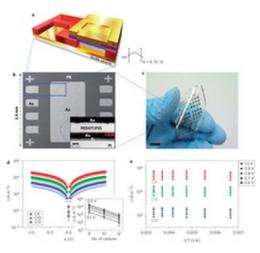June 6, 2012 report
Research group creates bendable electronics that hold up under abuse

(Phys.org) -- A team made up of researchers from the Korean Gwangju Institute of Science and Technology, Seoul University and Rice University in the United States have created a flexible test substrate with embedded single molecule thick electronic components that is able to withstand torturous contortions that would destroy any other electronic devices. The team, as they write in their paper published in Nature Nanotechnology, believe their tests show that flexible devices can be made using single-molecule thick electronic components.
Researchers all over the world are involved in trying to create flexible electronic devices, a development that would allow for the creation of new forms of consumer products; bendable cell phones, displays that could be molded into a backpack or smart devices embedded in rounded furniture, are just some examples. The problem of course is that when transistors or other electronic parts are attached to a substrate, bending that substrate causes tension between the part and the substrate leading to cracking or tearing and subsequent failure of the device.
In this latest effort, the team chose polyimide for the substrate because of its bendable properties and also because it doesn’t break down when exposed to high temperatures, which is important because when a material is bent or twisted, heat can be produced. When it is bent many times in succession, things can get very hot. They then created single-molecule thick devices with two terminals that work similarly to a diode using alky molecules that self assemble into monolayers.
To test their concept, they created 512 such devices, each just 3 centimeters square, and then began subjecting them to various bending exercises. The devices were bent over cylinders and toothpicks, they were twisted through several degrees of motion and were even bent into a helix. Some were bent as many as a 1000 times in quick succession. All the while each remained connected through their terminals to a DC power source so that the researches could see if they lost their conductive abilities.
The team is happy to report that not a single failure was experienced during their testing, and upon closer inspection found that no degradation of the components occurred, proving they say, that the concept is sound. The next step of course will be to see if devices that require three prongs, such as transistors can withstand the same degree of abuse. If successful, the team’s work may just lead the way to such devices as phones that can be folded up and put in a back pocket without fear of breakage when sitting down.
More information: Flexible molecular-scale electronic devices, Nature Nanotechnology (2012) doi:10.1038/nnano.2012.81
Abstract
Flexible materials and devices could be exploited in light-emitting diodes1, electronic circuits2, 3, memory devices4, sensors5, 6, displays7, 8, solar cells9 and bioelectronic devices10. Nanoscale elements such as thin films11, 12, nanowires13, nanotubes14 and nanoparticles4 can also be incorporated into the active films of mechanically flexible devices. Large-area devices containing extremely thin films of molecular materials15, 16 represent the ultimate scaling of flexible devices based on organic materials, but the influence of bending and twisting on the electrical and mechanical stability of such devices has never been examined. Here, we report the fabrication and characterization of two-terminal electronic devices based on self-assembled monolayers of alkyl or aromatic thiol molecules on flexible substrates. We find that the charge transport characteristics of the devices remain stable under severe bending conditions (radius ≤ 1 mm) and a large number of repetitive bending cycles (≥1,000). The devices also remain reliable in various bending configurations, including twisted and helical structures.
Journal information: Nature Nanotechnology
© 2012 Phys.Org





















